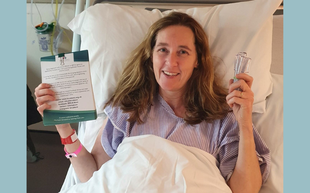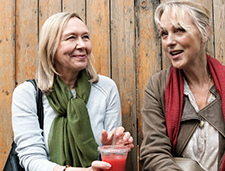Elizabeth: "There are always options at different stages of your life."
Understanding hereditary cancer risk and jewish heritage
At Ovarian Cancer Action, we’re here to help you understand your risk of hereditary cancer and the steps you can take to protect your health. Knowing your family history and any genetic links, such as Ashkenazi Jewish ancestry, can be life-saving.
Here, Elizabeth shares her personal journey of discovering her BRCA2 gene fault, making proactive decisions, and supporting others through her experiences.
Discovering the gene fault
Towards the end of 2008, I found out that I carried a BRCA2 faulty gene which I had inherited from my mother. Her sister (my maternal aunt) had been tested a few months before as she had been diagnosed with breast cancer. Her consultant thought it would be sensible for her to be tested because of my mother’s ovarian cancer diagnosis and our Ashkenazi Jewish ancestry.
I wanted to find out immediately if I carried the gene fault as I was in my early forties and didn’t want to wait for cancer to ‘get me’. I was told that I had up to an 85% chance of developing breast cancer and up to 50% chance of ovarian cancer over my lifetime.
Taking preventative steps: hysterectomy and mastectomy
Just four months after my test result, I decided to have my hysterectomy first. This was a relatively easy choice to make as I had finished my family a few years before and I knew how difficult it is to screen for ovarian cancer. I recovered very well from this first surgery, having found a wonderful menopause and HRT consultant who could guide me through my surgically-induced menopause at a relatively young age.
Five months later I went up to London for my skin-sparing bilateral mastectomy with immediate reconstruction using implants. For me, one of the hardest parts was leaving my two small daughters, although they were in the very safe and capable hands of my husband. My local hospital didn’t offer this type of reconstruction back in 2009, so I had to have surgery in London, some distance from where I live and too far for the children to visit me.
The operation went well without any complications, and I was in hospital for a week. However, I felt very isolated in hospital as I was the only patient on the ward having prophylactic surgery, quite different from having an operation due to a cancer diagnosis. This type of operation wasn’t as common it is today, so the nurses hadn’t come across many patients like me.

Elizabeth recovering from surgery.
Living with risk and continued vigilance
With risk-reducing surgery, it is a unique situation to be in as you are well and have no cancer diagnosis, but have been told that you have an extremely high chance of developing various cancers. Surgery isn’t for everyone, and I totally appreciate that some women cannot face having life-changing operations. I was very lucky and had the support of family and friends and was not working at the time and could take my time recovering without the pressure of going back to work – a privilege not everyone has!
Even post risk-reducing mastectomy it is vital that we still carry out monthly breast examinations post-surgery and seek advice if we are concerned or notice any changes.
Facing new challenges and reconstruction decisions
In 2019, when I was examining my breasts I noticed a small lump under my left armpit. Naturally, I was scared and thought the worst – even though I have reduced my risk immensely, there is still a chance of developing cancer and that worry for me never quite goes away!
I immediately made contact with my local breast clinic, and they were fantastic. They organised for an ultrasound and an MRI to check both breasts and to make sure the implants were still intact. Unfortunately, the right implant had developed a small tear, but fortunately the left one was intact and the lump under my armpit was just a hair follicle.
I was then offered a couple of options; either replace the implants or look into the possibility of a DIEP-flap reconstruction (where tissue from your tummy is used to reconstruct the breasts). After an MRI to check the viability of my blood vessels and further discussions with the plastic surgeon, I decided to go ahead with the DIEP-Flap. Originally, I didn’t have enough body fat to even contemplate this type of surgery, but this time as a post-menopausal 53-year-old, things were different.
Navigating surgery during the COVID-19 pandemic
So the big day was all booked in for March 2020 and then COVID-19 arrived, postponing all elective surgery, which was obviously the right thing to happen. Luckily, I got a call six months later to be told that an operating slot had become available. To be honest, I nearly backed out and was seriously thinking about opting for the simpler implant-based revised reconstruction. The fear that I had originally experienced all those years ago, came back, which did surprise me.
It made me realise how important a support network is for women, especially when they are feeling so vulnerable and scared.
However, I was determined to stick to the plan and to get as fit as possible, both mentally and physically, for the surgery.
My operation lasted just under 12 hours, but it felt like 2 minutes! I felt comfortable during that first post-op night, being constantly monitored, and cared for by the lovely night staff. I was out of bed the next morning and sat in a chair for a short while and had a visit from the physio. Even though I was walking hunched over due to the tummy scar, I felt surprisingly well.
Reflecting on recovery and gratitude
Seeing my new breasts for the first time was quite an emotional moment. I asked for my nipples to be removed this time (meant less scarring and slightly less risk from the BRCA point of view). I was surprised how good they looked and very natural.
All pathology came back normal which was a great relief (I had formed rather a lot of scar tissue, also known as a capsule, around the implants, and two lymph nodes were removed, so all tissue was checked by the lab). Recovery went well and I was back to work after seven weeks, taking things very gently at first.
I always say to the women that I meet that I wish I hadn’t worried so much about the procedure. What I do often say to people struggling with reconstruction possibilities is that there are always options at different stages of your life. For me, the implant reconstruction was the right choice for me at that time, and 11 years later, the DIEP-Flap operation was meant to be!
I am forever grateful to all the doctors and nurses who have been there over the years, supporting me with my surgeries and decisions I have had to make, and of course, to my family.
Helping others through BRCA Kent
Although I had wonderful support throughout the time since my genetic testing, I still felt isolated as nobody really knew what I was going through and how I was feeling. I started to think of ways that I could help other women in the same situation as myself.
After my initial mastectomy surgery, I received a call from a friend who told me that she knew of a lady who was in the same situation as I had been in and asked if I could talk to her to try and comfort and reassure her. This lady has become a great friend of mine and now helps me run BRCA Kent. Since that day, I have met with many ladies to share my experiences and to help them get through their BRCA journeys, many of whom have become good friends.
In November 2015, I helped one of our local hospital consultants organise a BRCA Awareness Day in Kent. Everyone was astounded by the amount of interest we received and the fantastic numbers in attendance. It was certainly apparent that there was a great need for a local support group in Kent, and this is when it was decided to formalise a support group independent of any NHS Trust.
BRCA Kent has now been running for over 9 years now and has been a huge success. We run meetings in two locations in Kent, and currently have 245 members. It is incredibly rewarding to meet women who have just been diagnosed with a BRCA gene fault, to reassure them and be with them throughout their journeys.
Take action today
Understanding your risk of hereditary cancer, especially with links to Ashkenazi Jewish ancestry, can empower you to take control of your health. If you have a family history of breast or ovarian cancer, speak with your GP about genetic testing and preventive measures.
At Ovarian Cancer Action, we’re here to support you with resources, expert advice, and a community that understands. Visit our website to learn more about BRCA gene faults, family risk, and how you can take proactive steps for yourself and your loved ones.


